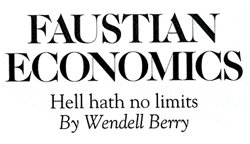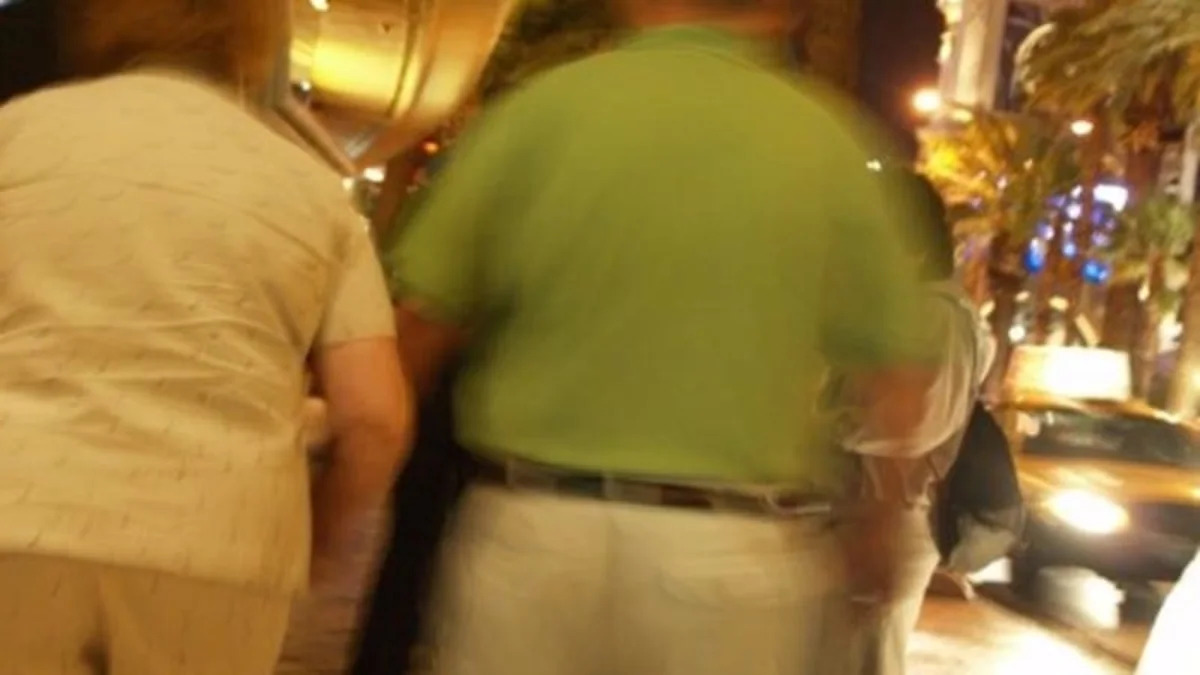I covered the AFVI Expo last week and that trip was my first visit to Las Vegas. I've heard the stories, the advertising campaign that tries to sell Sin City as, well, Sin City that takes your credit card. What interested me the most, though, was how my environmentalist mind would react to being in a city that, quite honestly, celebrates excess and waste. I didn't expect to feel comfortable in an oasis of VIP come-ons and bright lights surrounded by a harsh desert. I arrived in town around noon and, during my lunch at a quite reasonable buffet (Indian food, not one of those with endless tables featuring every food ever), I happened to read Wendel Berry's essay Faustian Economics from the latest issue of Harper's. Whoops.
Berry, who wrote an astounding collection of essays called The Long-Legged House back in 1969, takes on biofuels in the Harper's essay. Well, he starts with biofuels and smoothly segues into a discussion of limits, reductions and how it will ever be possible to really come to terms with the way we're consuming the world's resources. More thoughts on this after the break.
 It was odd to read an essay about learning to live withing our limits in a city that tries so to make you forget that there is any such thing. Whether we're talking about food, money, drinks, sex, fun or whatever else you want, Las Vegas is where limits go to die. And to think, this is where the Alternative Fuel Vehicle Institute has found a home. Of course, Vegas is much more than the Strip and the casinos, but that's what is shoved in a visitor's face from second one. Just like there's more to Vegas than meets the eye, there is much more to the idea of limits, and limiting our consumption of all sorts of items, than gets shoved upon us in our daily life. Berry writes:
It was odd to read an essay about learning to live withing our limits in a city that tries so to make you forget that there is any such thing. Whether we're talking about food, money, drinks, sex, fun or whatever else you want, Las Vegas is where limits go to die. And to think, this is where the Alternative Fuel Vehicle Institute has found a home. Of course, Vegas is much more than the Strip and the casinos, but that's what is shoved in a visitor's face from second one. Just like there's more to Vegas than meets the eye, there is much more to the idea of limits, and limiting our consumption of all sorts of items, than gets shoved upon us in our daily life. Berry writes:
[There is a] dogged belief that what we call the American Way of Life will prove somehow indestructible. We will keep on consuming, spending, wasting, and driving, as before, at any cost to anything and everybody but ourselves. This belief was always indefensible - the real names of global warming are Waste and Greed - and by now it is manifestly foolish.
While I leave it to you to search out the full article (Harper's doesn't make its contents available online unless you are a subscriber, so you'll have to do so or head over to your local library or newstand and find the May 2008 issue) and read the elegant way that Berry begins (and ends) his article speaking about biofuels but then spends the bulk of the article arguing that the best way to live a fuller life now is to better understand our limits. In the same way that every painting has a limit (be it the canvas or the size of a wall) but not every painting has yet been created, Berry argues (and I agree) that human life can be improved by turning down the snake oil of a limitless future with a rediscovery of living within our means, both economic and environmental. In Berry's words:
We will have to start over, with a different and much older premise: the naturalness and, for creatures of limited intelligence, the necessity, of limits. We must learn again to ask how we can make the most of what we are, what we have, what we have been given. If we always have a theoretically better substitute available from somebody or someplace else, we will never make the most of everything.
I don't want to misrepresent what Berry says. He is in favor of "green" alternatives like biofuels and other alternative energy sources, but only "provided they make sense." As much as we like to cover the latest petroleum alternatives here on AutoblogGreen, we can't deny the fact that the biggest improvement you can make to your transportation carbon footprint is to simply drive less. What Berry argues so well - and the whole reason I bring this to your attention - is that driving (and consuming) less does not mean our lives are somehow less full, less brilliant, less worthwhile. In fact, getting used to living with limits now is really the smartest thing we can do. Berry writes:
And so, in confronting the phenomenon of "peak oil," we are really confronting the end of our customary delusion of "more." Whichever way we turn, from now on, we are going to find a limit beyond which there will be no more. To hit these limits at top speed is not a rational choice.
Well said. So well said, in fact, that I couldn't let what I read in Vegas stay in Vegas.
Berry, who wrote an astounding collection of essays called The Long-Legged House back in 1969, takes on biofuels in the Harper's essay. Well, he starts with biofuels and smoothly segues into a discussion of limits, reductions and how it will ever be possible to really come to terms with the way we're consuming the world's resources. More thoughts on this after the break.
 It was odd to read an essay about learning to live withing our limits in a city that tries so to make you forget that there is any such thing. Whether we're talking about food, money, drinks, sex, fun or whatever else you want, Las Vegas is where limits go to die. And to think, this is where the Alternative Fuel Vehicle Institute has found a home. Of course, Vegas is much more than the Strip and the casinos, but that's what is shoved in a visitor's face from second one. Just like there's more to Vegas than meets the eye, there is much more to the idea of limits, and limiting our consumption of all sorts of items, than gets shoved upon us in our daily life. Berry writes:
It was odd to read an essay about learning to live withing our limits in a city that tries so to make you forget that there is any such thing. Whether we're talking about food, money, drinks, sex, fun or whatever else you want, Las Vegas is where limits go to die. And to think, this is where the Alternative Fuel Vehicle Institute has found a home. Of course, Vegas is much more than the Strip and the casinos, but that's what is shoved in a visitor's face from second one. Just like there's more to Vegas than meets the eye, there is much more to the idea of limits, and limiting our consumption of all sorts of items, than gets shoved upon us in our daily life. Berry writes:
[There is a] dogged belief that what we call the American Way of Life will prove somehow indestructible. We will keep on consuming, spending, wasting, and driving, as before, at any cost to anything and everybody but ourselves. This belief was always indefensible - the real names of global warming are Waste and Greed - and by now it is manifestly foolish.
While I leave it to you to search out the full article (Harper's doesn't make its contents available online unless you are a subscriber, so you'll have to do so or head over to your local library or newstand and find the May 2008 issue) and read the elegant way that Berry begins (and ends) his article speaking about biofuels but then spends the bulk of the article arguing that the best way to live a fuller life now is to better understand our limits. In the same way that every painting has a limit (be it the canvas or the size of a wall) but not every painting has yet been created, Berry argues (and I agree) that human life can be improved by turning down the snake oil of a limitless future with a rediscovery of living within our means, both economic and environmental. In Berry's words:
We will have to start over, with a different and much older premise: the naturalness and, for creatures of limited intelligence, the necessity, of limits. We must learn again to ask how we can make the most of what we are, what we have, what we have been given. If we always have a theoretically better substitute available from somebody or someplace else, we will never make the most of everything.
I don't want to misrepresent what Berry says. He is in favor of "green" alternatives like biofuels and other alternative energy sources, but only "provided they make sense." As much as we like to cover the latest petroleum alternatives here on AutoblogGreen, we can't deny the fact that the biggest improvement you can make to your transportation carbon footprint is to simply drive less. What Berry argues so well - and the whole reason I bring this to your attention - is that driving (and consuming) less does not mean our lives are somehow less full, less brilliant, less worthwhile. In fact, getting used to living with limits now is really the smartest thing we can do. Berry writes:
And so, in confronting the phenomenon of "peak oil," we are really confronting the end of our customary delusion of "more." Whichever way we turn, from now on, we are going to find a limit beyond which there will be no more. To hit these limits at top speed is not a rational choice.
Well said. So well said, in fact, that I couldn't let what I read in Vegas stay in Vegas.


Sign in to post
Please sign in to leave a comment.
Continue